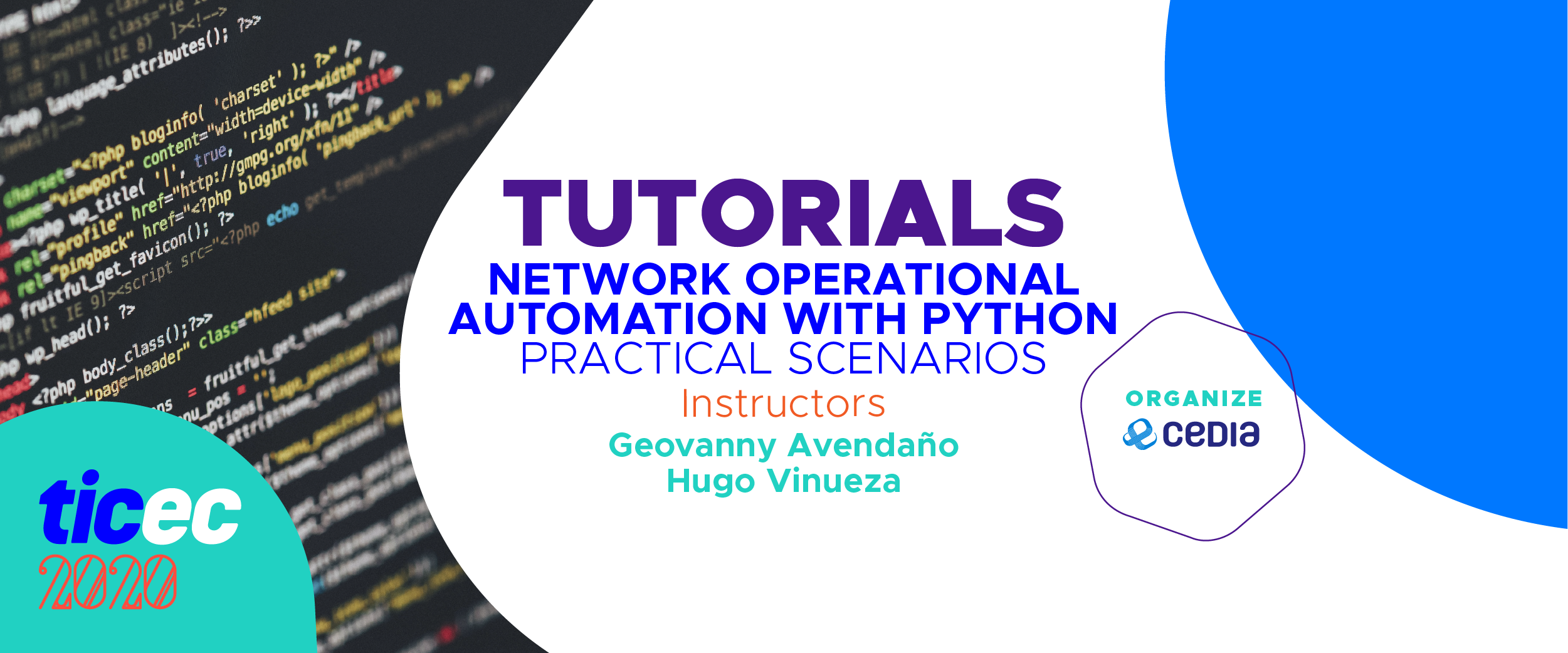You are here: Home / TICEC 2020 / EVENTS / Tutorials

Instructors: Alberto Molina, Ane Iturzaeta
The workshop focuses on the demonstration of the Microsoft Azure platform in the world of the Internet of Things. This workshop will be taught by collaborators belonging to Microsoft Spain and will present case studies to be replicated with attendees with Azure functionality in IoT.

Instructor: Wilmar Hernandez, PhD.
This workshop aims to provide researchers with the methodological skills and tools that will allow them to access external funding for their project ideas. The workshop-tutorial has as a use case the programs Incubator of projects and CEPRA call of the Ecuadorian Corporation for the Development of Research and the Academy – CEDIA.

Instructor: Eng. Diego Pacheco Prado
This workshop covers the following topics within this tutorial: 1) know the data sources that are accessed from this tool, 2) connect to Landsat and Sentinel satellite data sources, 3) filter the data through the metadata of the image and the geographic area, 4) cut the data of a specific area that for this tutorial we propose to be the Cajas National Park (PNC), 5) from the information obtained, construct spectral indices such as the Difference Vegetation Index Normalized (NDVI), 6) reduction of time series and useful data, 7) graph the NDVI index of sample sites and see their temporal behavior, 8) store results in Googe Drive and 9) publish the data obtained on a web platform.

Instructores: Eng. Angélica Quito, Mgs. Abg. Daniel Bueno
The purpose of this tutorial, within the framework of constitutional guarantees and governance, is to disseminate a methodology to formulate, execute, evaluate and control public policies that allow establishing the minimum bases for the implementation of Smart Cities. A theoretical-practical experience is proposed, starting with theoretical workshops on citizen participation, mediation with communities, the formation of political agendas, identification of stakeholders, stakeholder requirements, trees causing effect, development of public policies through the logical framework methodology.

Instructors: Eng. Geovanny Avendaño, Mgs. Eng. Hugo Vinueza, Mgs.
Knowledge of building codes to automate solutions is a necessary skill in the world of technology today. As Python is the programming language with the highest demand to achieve this attack, as well as one of the most widespread worldwide in the networking industry, we have decided to expose its advantages through practical demonstrations for direct application on live networks that may be under the administration of anyone in our audience. Thanks to the globalization of the internet you can access a large amount of information and material regarding programming in Python, for this reason, this tutorial aims to make a brief introduction to the programming language, along with its tools, and then focus on the development in practical cases that are presented on a day-to-day basis in networks at the Enterprise, Cloud, Datacenter and Service Provider levels.

Instructor: Eng. David Loja
The main objective of the tutorial is to demonstrate alternatives to data analysis in agriculture, differentiating current methodologies. To implement ML or AI, we must first acquire the field and historical data that is have available. All this information is important to convert to digital if it were not available. Subsequently, the analysis of said data, their relationship and their discrimination will allow the creation of a useful database.

Instructor: Adrián Gerardo Rodríguez
The tutorial will be taught in order to meet the following objectives: Introduction to analysis and interpretation of SAR data. Introduction to cloud processing, GIS programming, and handling of Google Earth Engine BigData. Multi-temporal SAR data for the analysis of change in the Earth’s surface. To do this, it will first be introduced to remote sensing with passive sensors, which is SAR, what is its difference with active sensors, as it captures information, such as its interaction with the Earth’s surface, what advantages and disadvantages do different SAR satellite platforms and how to acquire SAR data that are freely accessible.

Instructor: Eng. Jhony Villacis Sanchez
The main excuse for people for not being an entrepreneur, even if they have phenomenal talents, is always that they do not have money to undertake and the objective of the tutorial is to teach them both the methodology and the tools with which they can create high impact and scalability ventures without investing no money only your time and talent. The tutorial will focus on using agile methodologies for developing technological ventures and early validation. • We will focus on the creation of functional minimum viable products and the necessary tools for their development. • We will learn tools to create cross-platform applications • We will learn about Serverless and how to implement microservices easily and free of charge. • And we will move on to how to prepare a product launch to generate expectation in future users.
Previous Editions
About us
TICEC 2020 is the most important Congress on Information and Communication Technologies in Ecuador, which every year brings together more than 700 researchers, technicians, teachers, students and professionals in the areas of Science and Technology.
© TICEC. Powered by CEDIA.


